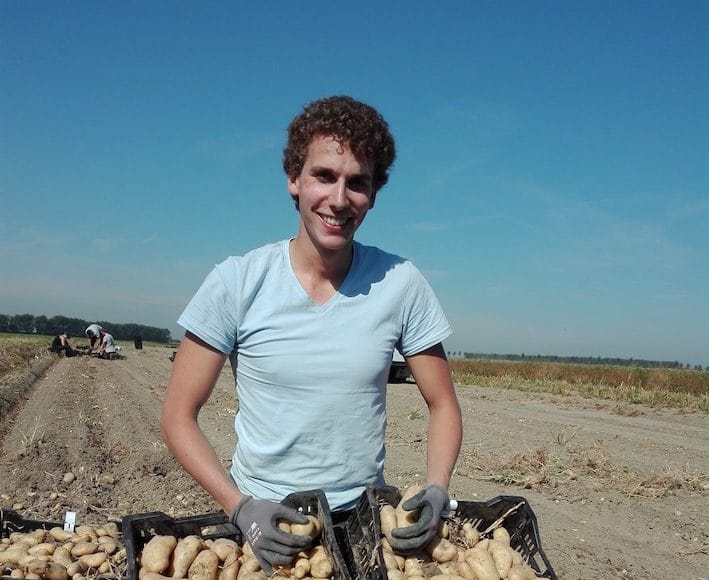In a hidden experimental field in Wageningen, the Netherlands, surrounded by tall maize plants, there are several smaller plots with potato plants. In some of these plots there are only dead plants, in others the plants have been affected by late blight (Phytophthora infestans) to a greater or lesser extent, but there are also fields with only perfectly healthy potatoes. The latter are the result of the latest crosses by the Wageningen company, Solynta. The breeders have succeeded, thanks to their revolutionary hybrid breeding technique, in making potato plants insusceptible to the dreaded potato disease.
Potatoes are generally clone-bred and grown vegetatively. A seed-potato is put in the ground, which produces some 10 new potatoes. One of the disadvantages of this system is that the parent plant transmits diseases to the offspring. Also, making the crop resistant is a long process.
Solynta has therefore selected a whole new approach: the company developed hybrid breeding with elite parent-lines, which allow propagation with true seeds. As a result, the breeders were able to cross-breed multiple resistance genes into the potato plant within a two-year period. The perfectly healthy potato plants in the test field have two resistance genes, whereas those with a single resistance gene exhibit minor signs of infection.
Natural protection against Phytophthora is of great importance for the environment. This potato disease causes many billions worth of damage worldwide and is a serious threat to food production. Up to now, farmers have only had one option to save their crop when the plants become infected: spraying heavily and frequently with a chemical pesticide.
Resistance to phytophora is just one example of the breakthroughs made possible by hybrid potatoes from true seed. This new breeding technique for potatoes makes it possible to rapidly introduce better varieties. Not only with natural protection against diseases, but also with improved taste, suitable for organic farming methods, or with an increased nutritional value. Furthermore, these hybrid potatoes can not only be bred multiple times faster than the usual clone bred but also be multiplied very rapidly. From one single plant one can produces about 25 million seeds in a year. In addition, potato seeds can thus be distributed quickly and easily around the whole world. One bag of 25 grams of true-seed replaces 2,500 kilos of seed-potatoes.
The European Union has co-financed this demonstration with a prestigious Horizon 2020 funding grant. The EU wants to promote the innovative power of companies and research institutes with the Horizon 2020 programme. Previously, Solynta was named a National Icon by the Ministry of Economic Affairs as a ground-breaking, innovative company which helps to create economic wealth while solving major social problems.












